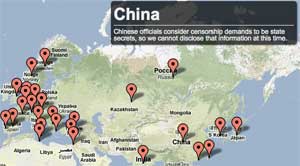 Google receives requests, including court orders, from many countries, for data or for removal of information on the various services it provides (search, YouTube, etc.).
Google receives requests, including court orders, from many countries, for data or for removal of information on the various services it provides (search, YouTube, etc.).
They’re experimenting with putting up a page that shows the number of requests they’ve received, and (partially) the action they took, for the most recent six months.
You can view their map and click the pushpins to see country-specific data. For China, it says
Chinese officials consider censorship demands to be state secrets, so we cannot disclose that information at this time.
Isn’t it interesting that rather than saying “removal requests” Google used the word “censorship” in this case?
To read more about legitimate (legal) requests and requests that do not have the force of law behind them and may simply be trying to intimidate a web site owner, visit the Chilling Effects Clearinghouse.
The Open Net Initiative seeks to identify and document Internet filtering and surveillance.
 So the “solution” to providing uncensored Chinese-language search, at least right now (beginning 22 March, 2010), is to have
So the “solution” to providing uncensored Chinese-language search, at least right now (beginning 22 March, 2010), is to have 

 The free flow of information, which is facilitated by the Internet, should have no respect for political borders. Nations that try to restrict the flow of information by either cutting it off at the border (using Internet routers and filtering) or by cutting it off in the “last mile” to your computer (using content filtering and throttling [see
The free flow of information, which is facilitated by the Internet, should have no respect for political borders. Nations that try to restrict the flow of information by either cutting it off at the border (using Internet routers and filtering) or by cutting it off in the “last mile” to your computer (using content filtering and throttling [see